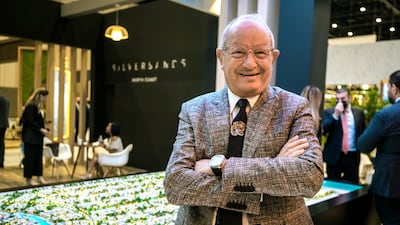Despite some saying gold has lost its lustre as a hedge against inflation, Egyptian billionaire Naguib Sawiris is bullish on the precious metal. He also has no intention to invest in cryptocurrencies, is looking at including green energy assets in his investment portfolio and plans to divest his stake in the Euronews television channel.
“I’m still very bullish [on gold] and it is a safe haven. People now are comparing Bitcoin with gold; it’s a wrong comparison,” Mr Sawiris, 67, told The National in an interview on Wednesday.
The entrepreneur, who has a net worth of $3.2 billion, is executive chairman of Cairo-based Orascom Investment Holding, whose interests span financial services, mining, telecoms, media, real estate and hospitality businesses, among others.
He is also chairman of La Mancha Holding, which launched a $1.4bn investment fund this year to pursue investments in gold mining. Mr Sawiris also sits on the boards of both Evolution Mining, the second-largest gold producer in Australia, and Endeavour Mining, Africa’s third-largest gold producer.
In February, AKH Gold, a company Mr Sawiris backs, signed a deal to explore nine blocks in Egypt’s gold-rich Eastern Desert, following a shake-up in regulations to attract more investment in the country’s gold mining sector.
The billionaire considers Bitcoin as a “very speculative” investment, which is facing a lot of challenges in terms of the regulatory environment.
“It’s a very risky business, I’m not into this,” he said.
The volatile nature of cryptocurrency trading and the wild price swings in recent months have drawn regulatory ire. Central banks around the world have been reluctant to endorse cryptocurrencies because of their lack of underlying value, their traceability and regulatory oversight.
Last month, China, the world’s second-largest economy, banned the mining and trading of Bitcoin and other digital currencies. However, proponents of online assets expect them to compete with traditional currencies. El Salvador accepts Bitcoin, the world’s largest cryptocurrency, as legal tender.
Bitcoin dropped 4.2 per cent to $64,293.66 at 6.28am UAE time on Thursday, according to coinmarketcap.com, which tracks prices. The world’s biggest digital currency has rallied more than 50 per cent since the start of October.
However, Mr Sawiris said “when the dooms day comes and it crashes, the last people in the row will lose”.
In 2015, the billionaire acquired a 53 per cent stake in Euronews through Media Globe Networks (MGN) and boosted his shareholding in 2017 to 60 per cent and further in 2020. MGN currently holds 88 per cent stake in the company and Mr Sawiris plans to divest it.
“Media is a very tough business. It is actually a loss-making business,” Mr Sawiris said. “We believe we will exit.”
“Between now and the beginning of the next year,” he said when asked, when he plans to divest. Mr Sawiris did not provide further details on the potential sale.
Mr Sawiris said he is focused on investing in the green energy sector and reducing the carbon footprint of the companies in his portfolio.
“All our mining operations are now going to shift to solar [power],” he said. “We are also looking at investing in a clean energy fund” that primarily invests in renewable energy, he said.
The world will still need conventional fuels during the transition to cleaner energy, so it is best to phase the exit from those positions, Mr Sawiris said.
The entrepreneur, who also heads companies in energy, agriculture, logistics and real estate, was surprised by the speed of the global economic recovery from the pandemic-driven slowdown last year.
“We were all under the impression that during the pandemic, we were not doing anything. But the fact is that people were working, just from their homes,” he said. “So, it was not a time of stagnation.”
However, he warned of an asset valuation bubble forming on the back of the quick economic rebound and abundant liquidity, especially valuations in global equities markets.
“I think shares are overpriced and there will be a correction sooner or later,” he said, adding that he expects a correction in the market “may be next year”.
Mr Sawiris said investors need to be selective about how they balance their overall portfolios and the stocks they pick in equity markets.
“I think people’s portfolios should always have a large part in what I call tech [stocks] like Amazon, Apple and Google,” he said. “They still have very big growth potential.”
“It will be very sound to have about 20 or 25 per cent like that [in the portfolio]. I think 20 per cent in gold because it gives you stability.”
Investments into shares such as banks, which are doing very well amid rebounding economies, are good, however, “my advice will be to always keep a position in cash because you don’t [know] what happens [next]”.


